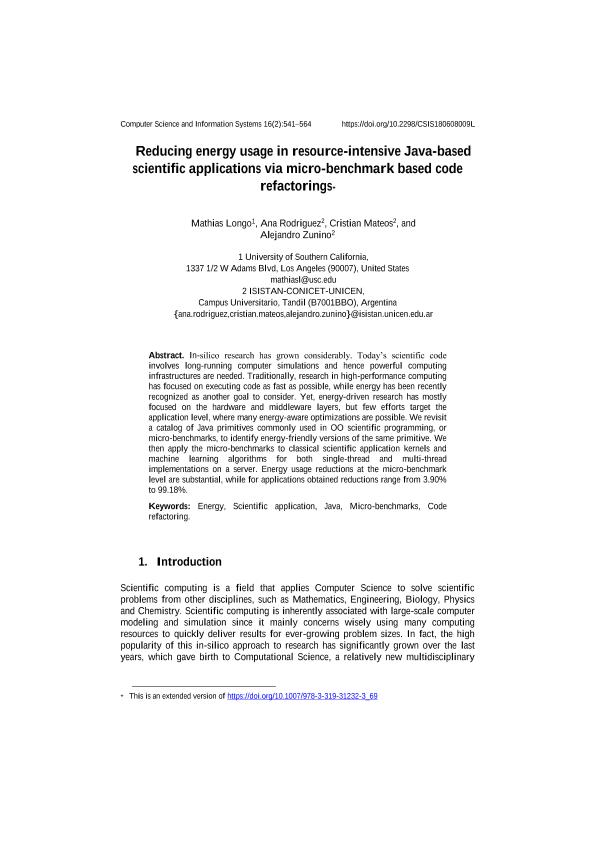Artículo
Reducing energy usage in resource-intensive Java-based scientific applications via micro-benchmark based code refactorings
Longo, Mathias ; Rodriguez, Ana Virginia
; Rodriguez, Ana Virginia ; Mateos Diaz, Cristian Maximiliano
; Mateos Diaz, Cristian Maximiliano ; Zunino Suarez, Alejandro Octavio
; Zunino Suarez, Alejandro Octavio
 ; Rodriguez, Ana Virginia
; Rodriguez, Ana Virginia ; Mateos Diaz, Cristian Maximiliano
; Mateos Diaz, Cristian Maximiliano ; Zunino Suarez, Alejandro Octavio
; Zunino Suarez, Alejandro Octavio
Fecha de publicación:
06/2019
Editorial:
Comsis Consortium
Revista:
Computer Science And Information Systems
ISSN:
1820-0214
Idioma:
Inglés
Tipo de recurso:
Artículo publicado
Clasificación temática:
Resumen
In-silico research has grown considerably. Today's scientific code involves long-running computer simulations and hence powerful computing infrastructures are needed. Traditionally, research in high-performance computing has focused on executing code as fast as possible, while energy has been recently recognized as another goal to consider. Yet, energy-driven research has mostly focused on the hardware and middleware layers, but few efforts target the application level, where many energy-aware optimizations are possible. We revisit a catalog of Java primitives commonly used in OO scientific programming, or micro-benchmarks, to identify energy-friendly versions of the same primitive. We then apply the micro-benchmarks to classical scientific application kernels and machine learning algorithms for both single-thread and multi-thread implementations on a server. Energy usage reductions at the micro-benchmark level are substantial, while for applications obtained reductions range from 3.90% to 99.18%.
Palabras clave:
Energy
,
Scientific applications
,
Java
,
Micro-benchmarks
,
Code refactoring
Archivos asociados
Licencia
Identificadores
Colecciones
Articulos(ISISTAN)
Articulos de INSTITUTO SUPERIOR DE INGENIERIA DEL SOFTWARE
Articulos de INSTITUTO SUPERIOR DE INGENIERIA DEL SOFTWARE
Citación
Longo, Mathias; Rodriguez, Ana Virginia; Mateos Diaz, Cristian Maximiliano; Zunino Suarez, Alejandro Octavio; Reducing energy usage in resource-intensive Java-based scientific applications via micro-benchmark based code refactorings; Comsis Consortium; Computer Science And Information Systems; 16; 2; 6-2019; 541-564
Compartir



